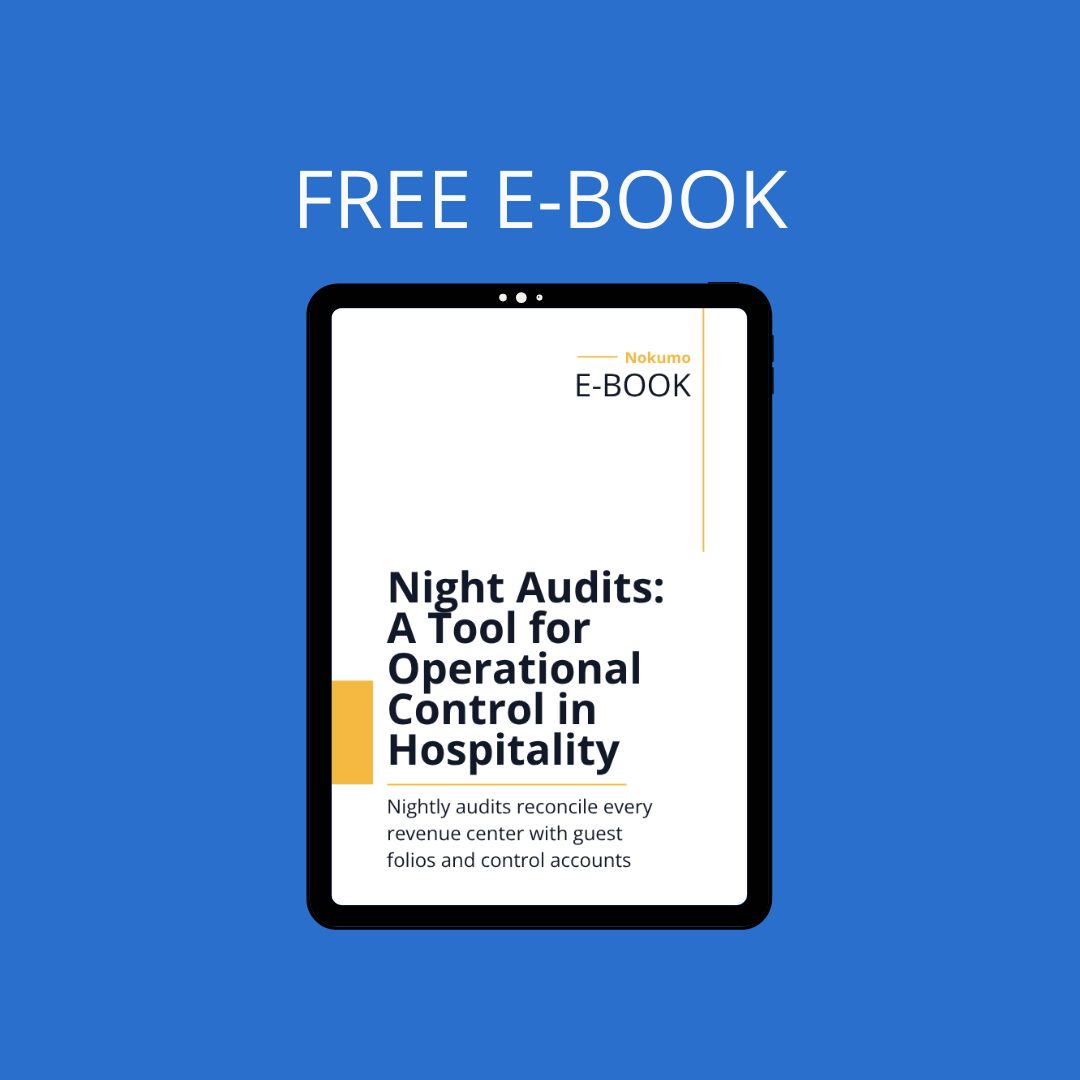Night Audits Made Easy: A Step-by-Step Guide for Hoteliers
A nightly blueprint for error free finances and stronger guest trust

Running a successful property requires more than just great service – it demands airtight financial control. The night audit acts as your daily financial health check, verifying every transaction while guests sleep. Think of it as your frontline defense against billing errors and revenue leaks that could silently erode profits.
This process ensures your front desk activities, room charges, and payment systems align perfectly. Without it, even minor discrepancies in guest accounts or tax calculations can snowball into costly issues. Proper execution helps you maintain compliance with accounting standards and local regulations, which is particularly vital for adhering to EU hospitality laws.
Beyond numbers, these reviews impact guest experiences. Imagine a traveler checking out to find incorrect minibar charges or missing loyalty points. Regular audits prevent such frustrations by catching errors before they reach customers. They also create reliable data trails that help managers spot operational trends and make informed decisions.
In the following sections, you'll master efficient techniques to streamline this essential task. We'll break down complex procedures into manageable steps any team can implement, regardless of your property's size or software setup.
Key Takeaways
-
Daily financial verification protects your bottom line from hidden errors
-
Accurate guest billing strengthens trust and repeat business
-
Compliance with tax laws and reporting standards becomes effortless
-
Operational insights emerge from consistent data tracking
-
Automation tools reduce manual work without sacrificing accuracy
Understanding the Night Audit Process
To safeguard your hotel's revenue, a detailed daily financial reconciliation process is essential. This systematic review acts as your property’s pulse check, ensuring every euro spent or earned aligns with recorded data. It transforms raw numbers into actionable insights while guests rest.
What Is a Financial Checkpoint in Hospitality?
Your property’s night audit verifies all monetary activities from room rentals to minibar sales. It calculates the Net Outstanding Balance (NOB) using this formula:
-
Previous day’s closing balance
-
Plus new charges (debits)
-
Minus payments received (credits)
This creates a clear snapshot of your financial position. For example, a guest’s spa charge must match PMS records before rolling into the next business day.
Tracking Money Movement Effectively
Every transaction – check-ins, upgrades, or late checkouts – leaves a digital paper trail. Your team cross-references:
-
Room revenue against occupied inventory
-
Restaurant charges with POS system data
-
Incidentals like parking fees or dry cleaning
Automated reports then compile this information into departmental summaries and guest ledger updates. These documents become your compass for tax compliance and operational decisions.
Why the Night Audit Is Vital for Your Hotel Operations
Your hotel's financial health depends on meticulous daily checks that balance guest accounts with operational data. These reviews transform raw numbers into trust-building tools while maintaining compliance with EU hospitality standards.
Building Trust Through Precision
Every room charge, restaurant bill, and spa fee must match your property management system. Errors in these areas don’t just create accounting headaches – they directly impact how travelers perceive your brand. One mismatched minibar charge could turn a satisfied guest into a vocal critic.
Systematic verification catches billing mistakes before checkout. Imagine spotting an incorrect room upgrade fee at 2 AM instead of during a busy morning departure. This proactive approach prevents awkward conversations and preserves relationships.
Consistent accuracy also reveals spending patterns. You might notice business travelers ordering more room service or families using laundry facilities frequently. These insights help tailor promotions and optimize pricing strategies.
Reliable financial data supports smarter decisions about staffing, inventory, and service improvements. When your numbers reflect reality, you can confidently adjust operations to boost profitability without compromising quality.
Key Steps in the Night Audit Process for Hoteliers
Mastering daily financial verification requires a methodical approach. Your team needs clear protocols to handle monetary activities efficiently while maintaining operational flow.
Finalizing Daily Monetary Activities
Begin by locking all transactions in your PMS. This freezes charges for:
-
Room bookings and upgrades
-
Food & beverage sales
-
Ancillary services like spa treatments
Reconcile payment methods separately. Match cash totals with register counts, then verify credit card batches against bank deposits. Modern properties often handle 5+ payment types – from mobile wallets to corporate accounts.
Confirming Traveler Financial Records
Review every guest folio systematically. Check for:
-
Missing restaurant charges
-
Incorrect room rate applications
-
Unrecorded incidentals
Update room statuses simultaneously. A housekeeping discrepancy (like a vacant room marked occupied) could indicate billing errors. Your auditor should resolve mismatches before progressing.
These steps create audit trails for tax compliance. Proper execution prevents revenue leakage while building traveler trust through precise billing. Consistent process implementation also reveals patterns in payment delays or frequent refund requests.
Manual vs. Automated Night Audits: Making the Right Choice
Your hotel's operational efficiency hinges on choosing the right verification method. Traditional hands-on approaches and modern tech solutions each offer distinct advantages depending on your property's needs.
Comparing Hands-On and Automated Systems
Manual methods require staff to cross-check every transaction using spreadsheets or basic software. Teams review room charges, update inventory counts, and verify payment batches line by line. While this approach keeps you directly involved, it consumes hours better spent on guest services.
Human error risks increase with fatigue during late shifts. A tired employee might misplace decimal points or overlook duplicate entries. These errors compound over time, creating financial discrepancies that demand costly corrections.
The Role of Property Management Systems (PMS)
Modern systems like Nokumo transform verification through automation. Integrated PMS tools sync restaurant sales, room upgrades, and ancillary charges in real time. Your team receives pre-generated reports showing reconciled transactions by department.
Automated management tools flag inconsistencies instantly – like a spa charge without matching guest folio data. This prevents revenue leakage while maintaining compliance with VAT regulations. Staff then focus on resolving exceptions rather than processing routine checks.
Transitioning requires evaluating your property's size and tech infrastructure. Smaller hotels might retain partial manual control, while larger properties benefit most from full automation. Either way, pairing reliable software with trained personnel ensures financial accuracy without sacrificing operational speed.
Embracing Technology to Simplify Your Night Audit
Modern tools transform how hotels manage daily financial operations. Cloud-based systems like Nokumo eliminate outdated processes by handling transitions between business days automatically. At midnight, your property management syncs reservations, charges, and room statuses without staff input.
Streamlined Reporting and Real-Time Data
Your team gains instant access to financial insights through automated processing. Charges post immediately when services are booked – no waiting for batch updates. This approach reduces errors from manual entry while keeping reports current.
|
Traditional Method |
Automated System |
|
Manual button clicks required |
Zero human intervention |
|
Data updates after audit completion |
Real-time sync across platforms |
|
Limited reporting capabilities |
Customizable filters by date/time |
|
Future projections unavailable |
90-day revenue forecasts |
Immediate transaction posting lets you track earnings as they happen. View expected revenue for next month’s bookings alongside today’s restaurant sales. This always-on visibility helps adjust staffing or promotions instantly.
Your data becomes a strategic asset with 24/7 access. Generate occupancy trends or payment method analyses in seconds. Cloud systems also maintain compliance with tax laws through accurate, timestamped records.
By adopting these tools, you reclaim hours previously spent on manual checks. Staff focus on guest needs while technology handles financial heavy lifting. The result? Faster decisions, happier travelers, and tighter profit margins.
Ensuring Accuracy and Minimizing Discrepancies
Precision forms the backbone of reliable hotel accounting. A meticulous reconciliation process catches financial mismatches before they distort your records, maintaining compliance with tax requirements. This daily practice safeguards your revenue while building traveler confidence through error-free billing.
Best Practices for Reconciliation
Start by comparing your property’s closing balance with expected revenue totals. Review every guest folio – missing restaurant charges or duplicate spa fees often hide in plain sight. Cross-reference invoices with reservations to ensure room upgrades and package deals align with payments received.
Spotting common errors requires a methodical approach. Check for unpaid invoices lingering in your system or reservations without attached charges. Address these discrepancies immediately by adjusting account balances or issuing refunds. Document every correction to create an audit trail that supports future reviews.
Your process should generate two vital outputs: corrected financial records and clean data for analysis. Accurate statistics on occupancy rates or RevPAR (Revenue Per Available Room) depend on this daily scrubbing. These insights help optimize pricing strategies and operational efficiency across departments.
Automated tools streamline reconciliation by flagging mismatched transactions in real time. Cloud-based systems maintain version histories, letting teams track changes and prevent recurring issues. Consistent execution turns this task into a strategic advantage rather than a nightly chore.
Integrating Night Audit Reports into Daily Management
Transform raw numbers into actionable strategies using reports generated through daily financial checks. These documents reveal patterns in occupancy rates, guest spending habits, and revenue per available room (RevPAR) – critical metrics for refining your business approach.
Customize reports by date ranges or specific hours to match your property's rhythm. Schedule automatic delivery to your team’s inboxes – hourly snapshots for high-season monitoring or weekly summaries during slower periods. This eliminates paper trails while keeping everyone aligned on financial performance.
Analyze trends to spot opportunities. Maybe spa bookings peak on rainy days, or room service orders surge after 9 PM. Use these insights to adjust staffing levels, tailor promotions, or optimize menu pricing. Your revenue streams become predictable when data drives decisions.
Regular review cycles turn numbers into compliance tools. Track tax calculations against EU regulations or verify payment method distributions. Integrate these reports into morning briefings to track daily performance against monthly goals, creating a culture of financial awareness across teams.
Conclusion
Night audits turn the lights-off hours into your property’s clearest view of financial reality. By reconciling every charge, payment, and system entry before a new business day starts, you eliminate creeping errors that distort revenue reports, disrupt guest trust, and create compliance risks. The discipline behind this process converts raw transactions into reliable figures that inform staffing, pricing, and investment decisions.
Whether handled manually or through integrated software, a consistent nightly review keeps profit, operational data, and guest satisfaction aligned. Accuracy caught at 2 a.m. prevents costly fixes at checkout, while clean records give managers the confidence to spot trends and adjust tactics quickly. When the audit closes, you gain more than balanced books—you secure a foundation of factual insight that lets the entire operation plan its next steps with certainty.
Get the Full Night Audit Handbook (Free 7-Page Guide)
Ready to stop revenue leaks before daybreak? This focused 7-page guide maps every step of the night audit, with checklists tailored to small inns, full-service resorts, and even vacation rentals, built on proven tasks such as Reconcile Folios, Balance Cash and Cards, and dual-check reviews for high-volume outlets. You will examine real error scenarios, compare manual and PMS-driven workflows, and plug pre-built templates for daily revenue, occupancy, and ADR snapshots straight into your morning briefings. Put nightly audits to work to secure every charge, flag fraud early, and hand managers data they can trust when the doors reopen.
